Eggs. It’s incredible just how versatile these little guys are and just how much we depend on them. Whether over easy, hard-boiled, baked in a cake or cookies, or used as a binder, it’s unlikely that a week goes by when you don’t use what might just be the world’s perfect food.
But you know what makes me sad? The idea that those of us who raise chickens for eggs may end up wasting some of them in the spring and summer because of over-production. We might then have to buy the much-inferior grocery store eggs in the winter when our hens have slowed down laying.
Fortunately, there are numerous ways—some far better than others—to preserve eggs for anywhere from a few weeks to several years. And if you would like to add to your long-term pantry to have fresh eggs available in a natural disaster or other crisis, there is one method of preservation that stands above the rest—lime-water preserving.
But first, let’s take a quick look at the other options for preservation.
Historical Methods For Preserving Eggs
In addition to lime-water preservation, there are many other methods used over the last several hundred years to keep eggs longer than they could last naturally.
DRYING – With this method, eggs are cracked, beaten, and then dehydrated either in a commercially purchased dehydrator or in an oven.
However, a potential problem with this method is that the eggs must be dried at a heat of 165°F or more. With most dehydrators, that isn’t possible. Without being heated to that temperature, you’re risking salmonella—and that’s not a good idea.
When done correctly and at appropriate temps, this method is acceptable, although the eggs yielded are better for cooking with than eating. Dried eggs can be vacuum sealed for even longer, safer storage.
FREEZING – To freeze eggs, you start the same way as drying: out of the shell and beaten. The biggest drawback to freezing eggs is that the process requires electricity—a freezer—for storage, and depending on your circumstances, electricity may not always be available.
MINERAL OIL (or cooking oil, butter, or lard) – With this method, you are essentially sealing the pores of the eggshell so that no bacteria can permeate it and thus contaminate the egg. But the fat source usually needs to be heated on a stovetop or in a microwave to melt it or purify it, and that requires electricity.
It’s also messy and, in the case of butter, can turn rancid. Storage may also attract rodents or insects.
SALT or WOOD ASH – Another preservation method is to store eggs in a box or crate willed with salt or wood ash. This should get you through winter but isn’t a viable longer-term solution. And both substances can permeate an eggshell and alter an egg’s flavor.
WATER GLASS – Water glass preservation is a chemical means for sealing and insulating whole eggs in a gel-like mixture of water and sodium silicate. For this method, the eggs must be very fresh—no more than 24 hours old. They become very slippery and potentially messy and should be pinpricked to prevent the eggs from exploding!
Related: How to Preserve Eggs with Waterglass
Why Preserve With Lime Water?
Not only will lime-water preserved eggs last for two or more years, but they are also preserved in the shell, so they are much more versatile when it comes time to use them. The taste and consistency of such eggs are nearly identical to fresh eggs.
Preserving eggs this way is super economical and a fantastic way to use all those eggs you can’t use as quickly as your chickens can lay them. They do not require heat or refrigeration for storage and will be an excellent option should access to power be lost. Neither will they attract rodents or bugs.
If you’re thinking “citrus” when you hear lime water, well, let’s clear that up right now. What we are actually talking about is slaked lime—a mineral commonly using in building for centuries. Also known as hydrated lime, it is different than the lime one might use in the garden.
Today, you can ask for slaked lime at a building supply store. But it is also used in pickling as an agent to “crisp up” cucumbers. Which means you might be able to find it in the canning section of your local grocery store. And of course, there’s always Amazon.
Just remember, the product you want is PICKLING LIME; the ingredient label should list CALCIUM HYDROXIDE and nothing else.
Even though it’s called pickling lime, you aren’t pickling your eggs when you do this. Pickling lime firms up and seals the eggshells.
Related: How To Pickle Eggs
What You Will Need
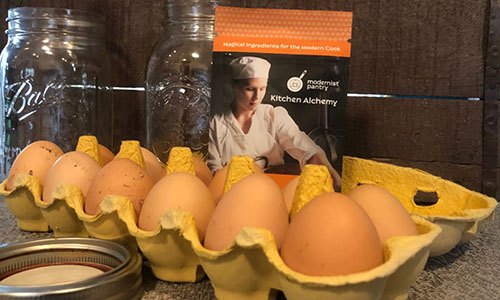
- Fresh eggs—ONLY fresh laid, unwashed eggs will work. Grocery store eggs are washed, and during washing, the natural “bloom” that prevents bacteria from entering through the pores in an egg’s shell is removed.
Furthermore, store-bought eggs are not sustainable outside of a refrigerator. (I bought mine from a kind neighbor.)
- Glass jar with a lid (or other water-tight container with a lid)
- Slaked lime or pickling lime (CALCIUM HYDROXIDE) and measuring spoon
- Bowl or jar for mixing lime solution
- Water
How To Lime-Water Preserve Eggs
In a large jar, mix room temperature water with one ounce (about two heaping tablespoons) of calcium hydroxide. You can adjust or multiply this ratio to suit your needs.
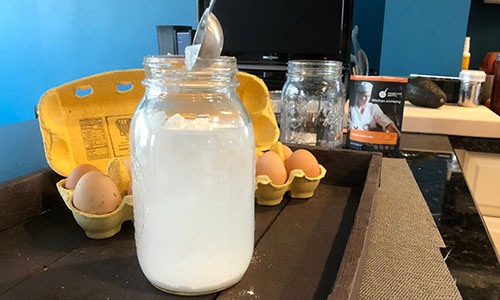
Shake or stir to mix. The mixture will be milky white.
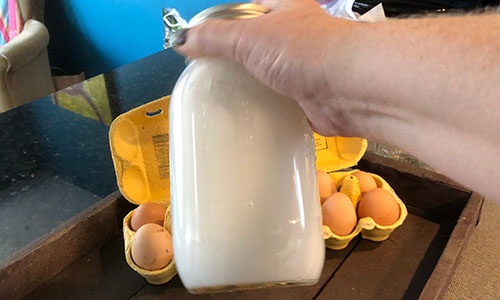 Choose eggs without cracks or any other issues and that are as fresh as possible. They should be clean but unwashed. Fill the jar with the eggs.
Choose eggs without cracks or any other issues and that are as fresh as possible. They should be clean but unwashed. Fill the jar with the eggs.
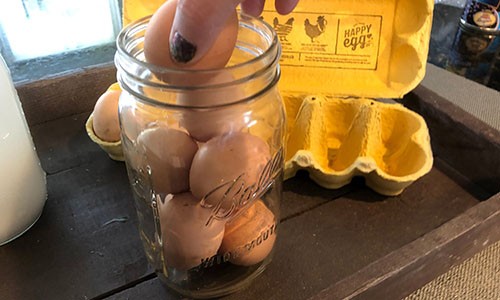
Pour the lime-water solution over the eggs, ensuring they are completely submerged.
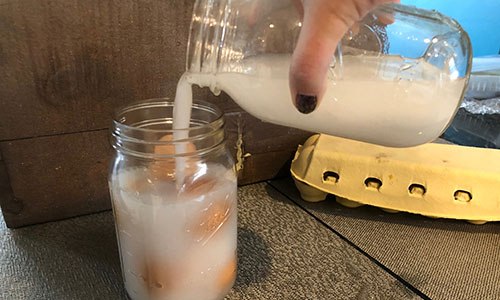
Cap the jar tightly.
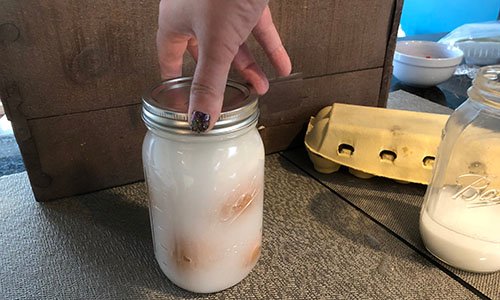 Store in a cool, dry location for up to two years.
Store in a cool, dry location for up to two years.
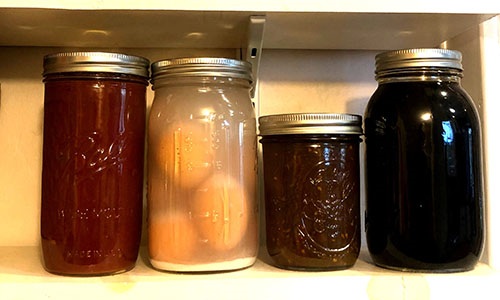 When you’re ready to use your preserved eggs, remove them from the solution and rinse.
When you’re ready to use your preserved eggs, remove them from the solution and rinse.
(Rinsing ensures the lime solution will not affect the flavor of the eggs.)
Then crack them as use them as desired.
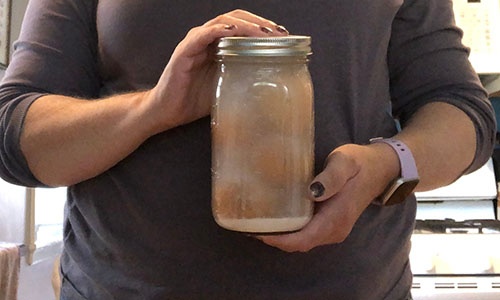 Could It Be Any Easier?
Could It Be Any Easier?
When you preserve eggs with lime water, you are:
- Ensuring a nutritious, versatile food source is available when you need it.
- Making the most of the eggs your chickens produce. (I hate wasting food, and I’m sure the same is true for you.)
Eggs preserved using this method:
- Do not require electricity for storage.
- Will not attract rodents or insects.
- Will remain viable for at least two years.
Preserving eggs for future use, whether for self-reliance, homesteading, or disaster preparation, is easy and smart.
What do you think? Do you have laying chickens? Will you try preserving eggs? Have you used a different method to preserve eggs? Let us know in the comments.
You may also like:
 How to Keep Eggs Fresh for Months with Mineral Oil
How to Keep Eggs Fresh for Months with Mineral Oil
What Happens When You Keep Your Meat in Salt For 1 Month (Video)
Baking Soda Substitutes and How to Use Them

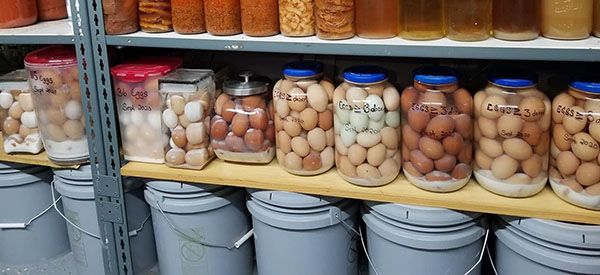



















problem I have with the article is it’s overbearing & obvious bias against the other egg preserving methods >> explain your preferred method but don’t try dinging the others with biased BS ….
water glassing has been around forever – explored that method along the other thoroughly >>> NEVER EVER heard of eggs “exploding” and needing to be “pinpricked” – talking 100s of sources with expert credentials ….
I thought it to be a great article and I feel you need to check your attitude at the door, you also have control issues.
Yes it was a Great article and obviously a better way to preserve eggs.
how much lime in a five gallon bucket to properly store eggs and which end points up. pointed or round.? thanks
doug
Next time try not to be so arrogant and obnoxious when commenting on something!
I raise organic free range layers that are also pets. I do get lots of eggs year round and with all this political shut downs and lies the restaurant I sold eggs to can no longer buy any so I have ever so many now. I will try the lime method. I enjoyed your presentation well. Thank you?
Can I do a few at a time? I only get up to 9 per day.
Thanks.
Did you forget the title of the article? It was designed to focus on this one method.
In these uncertain times, we should appreciate those who want to help others. Weed through the information, and you what works for you.
Don’t understand what the hell you just said.
I think, your thinking is scrambled. lol.
Trial and error. Why do y’all need perfect everything but the ones that came before y’all had to use trial and error. If it works it works if it dose not then try again if you fail, try again.
Good luck because you have no faith.
Read it again and slow down this time…
Great info. Kristin Conlin
Is it 1 Oz. lime to a quart of water? I couldn’t find the amount of water to use? Is it ok to open the jar and add eggs as they lay? I’ve only got 5 hens.
It’s a good idea to get as good a preserving plan as possible due to food poisoning. However, rotten eggs float while good eggs sink, so there’s a good screening to use.
Can someone explain (clean but unwashed) ?
I know to some this might be a dumb question but if I’m going to try this method, I’d like to know for sure. Thanks
Enjoyed your article. If the objective is to seal the eggs, have we tried wax? No stupid questions; right?
NO,
unless you wanted it to be cooked while being surrounded by the wax. You are talking hot wax?
Good idea, but no you can’t do that…
The object is to prolong the life of the egg or eggs. Clean unwashed eggs is what you need to use. So no chicken poop on the eggs or dirty eggs.
Nice clean eggs, right from the back side. Funny how we love eggs but they come from the area that also poop and pee comes from… LOL. We call them Kackle Berries.
You must ask your farmer for unwashed eggs. They might be dusty and need to be wiped clean but no water or hard rubbing. when the chicken lays an egg a wet coating is on the egg. you need this to stay on the egg inorder to use this lime method of preserving.
Cleaned means using a cloth/towel to gently wipe the egg and remove debris.
Scrape off eggs dont wash ,find in cleaning isleal,scraping pad
Wiped with a slightly damp cloth if needed, but not washed in warm/hot water and vigorously scrubbed. Really dirty eggs should not be preserved this way, so use them first.
don’t wash the eggs, just brush off anything that might be on them.. otherwise you risk wiping off the protective coating that is on them fresh from the chicken.. Most eggs around the world aren’t cleaned, only in the US will you primarily find that eggs are washed and sterilized prior to sale.
Clean as in no poop or nesting material on them. Just brush off gently without getting them wet..
clean eggs are ones that come out of the nest with no poop, mud, etc on them. “cleaned” eggs are ones rinsed under running water but not rubbed to clean. washing, or rubbing to get any dirt off also takes the “bloom” off, which leaves the pores of the egg shell open, and can allow pathogens to enter thru the egg shell, and may cause botulism or other bad things to enter the egg thru a washed shell.
Sometimes the environment where chickens lay eggs may not be completely clean so there may be debris or chicken faeces which stick to the eggs, as well as sometimes straw or other debris. The egg should be taken from a just-cleaned chicken bed thus reducing the risk of contamination (clean) but not washed otherwise the natural bloom that preserves the egg outside of a refrigerator for up to a month will be removed. If there is a little dust on the egg you can remove this with a soft cloth.
Clean means they have no manure on them. If your hens have worms, you will often find manure on the eggs. Healthy hens produce clean eggs. Unwashed means just that. Don’t wash them.
Illini Warrior – check the title of the article. Speaking of overbearing . . .
You blow on the egg to clean it.
The pricking is not during storage but only if you are going to boil the egg. It needs a pressure hole to not explode in the boiling water.
Question. If you can’t wash the eggs before putting picking lime soultion on them, how do you get the poop off?
My question exactly. Quite a few of the unwashed eggs I got from the farm are pretty poopy. Can I use a damp cloth?
I saw the article as informed and practical; the type of advice an aunt or uncle would tell because they genuinely cared about the hearer. There’s no need to become a walking encyclopedia if your aunt is telling you because she’s already found what is available in the local area, she’s already gone through the gluts and drops in supply, and all the in’s and out’s life throws which you don’t expect, and she’sl already adjusted for them….she doesn’t need to defend. Honestly, reader Illini Warrior, just consider your audience, something you should have learned in 5th grade English class.
The pinprick refers to hardboiling the egg after you take it out of the limewater. I think the author just forgot to specify. If you want a scrambled egg, just wash it off and break it open like usual but if you want to hardboil it you have to make a pinprick in the shell or it will explode in the pan because the lime has sealed up all the pores.
i didn’t see any of that. Just an explanation on each process. i thought it was an excellent article.
It just says a large jar. I would like it to be more specific measurements. So 1 quart water to one ounce lime mix ratio?
Looking at a couple of other sites for preserving eggs in lime water, the recommended ration is one ounce of lime powder (by weight) to one quart of water.
As I was testing out the recipe, I didn’t want to overdo it, so yes, I used a one-quart jar and filled it with as many eggs as would fit. If you have enough fresh eggs, you can use, really, any size jar. I’d guess a one-gallon jar would hold about 28 eggs or so, for example. For that gallon-sized jar, you’d need 4 ounces (about 8 tablespoons if you don’t have a kitchen scale) of lime.
Kristin: I really appreciate the fact that you followed the replies to your article and responded to questions posed by readers. Too many authors get their article posted and ignore what I consider valid questions. Thank you for taking the time to follow the responses to the article.
For those of us in the metric system:
1 US quart = 946ml
1 oz = 28g
I’d do a rough conversion of 1 lt water to 30g of calcium hydroxide.
in reality due to displacement if you have 28 eggs in a 1 gallon container you will likely only need about 2 quarts of water to completely submerge them.. I usually mix up 3 quarts, and dump whatever is left over an area where i see weeds popping up.. kills the weeds for good. 😀
You just need enough solution to cover the eggs in any size jar you use. Then as you add eggs each day/week (if you do) you add more solution so eggs are always completely covered. Use 1 ounce by weight of pickling lime per quart of water. I had 4 doz eggs. I used a 2 gallon jar and I made 1 gallon of solution. That was a lot more solution than I needed but it’s OK. I can just add eggs as I get them.
Yes. You can add eggs as you collect them. Add more juice if necessary. I use a sharpie and write the date on the lid or on a sticker on the jar.
Great ideas, thank you for explaining how to do in detail. Will plan on giving this a try. Thank you again!?
How much lime to how much water? Proportions are not given.
You need an ounce of lime for a quart jar. A gallon jar would need 4 ounces. Add the eggs to the jar before filling with water. (An ounce is about 2 tablespoons. No need to fret about getting the lime measured to a very exact amount.)
It doesn’t look any easier than this> I buy eggs from my neighbor but like you said, in the winter I have been having to buy the eggs from the grocery. I hate the taste, and the eggs are just not as healthy as those from free range chickens where there is a rooster with the hens. Thanks for the advise with the lime. I will use that when eggs are abundant from my neighbor this year.
Can you use the white food grade plastic pails instead of glass jars?
I didn’t find anything in my research that said you could. Therefore, I would not 🙂
Yes you can
Stu: Is that from first hand knowledge? Lime water, while not as caustic as other sodas, is still caustic and use might deteriorate the plastic over time. While one might be able to get away with plastic (which is really a very generic term for a lot of polymers of varying compounds) for short periods of time, prolonged use of plastic storing a caustic substance even as diluted as this just might cause the polymer to cast off undesirable chemicals in the chain.
If this is personal experience, please describe your experience in detail. If it is from some outside source, please list the source so that we may peruse it ourselves.
Worst case, put a large mylar bag in the pail first.
The other sites I’ve read with the same method all use the large foodgrade plastic pails… Because those articles were families preserving on a larger scale. I don’t like the idea of plastic leeching in to anything so I used a 2 gallon glass jar.
Thank you Claud Davis, You got me started prepping, several years ago. I greatly appreciate any and all articles that provids helpful information. This is not required reading, so I have to agree with Prep 201, above!
There is no way I can make use of this information at the present time, but that doesn’t mean that this is something that I should not make note of for future reference and to file in the good to know category. I think it is important to always leave one’s options opened! It is important to know how to do something from different approaches. In a push comes to shove scenario, that ability may make all the difference! As always, thank you for the info!
The important thing is to take a first step. Buy a few large Canning jars with lids that seal tight. Next pick up a small supply of Calcium Hydroxide (you can probably order it from Walmart, on-line. These will store nicely under your bed, until you have the opportunity to buy farm fresh laid eggs. Once you start it’s addicting!
I bought a small envelope of Calcium Hydroxide from Amazon. Very easy to store and will last practically forever (unless I start raising my own chickens!).
I’m in Central FL, drove half a day looking for pickling lime, even starting calling stores in the area. Nothing. Finally went to the “mrs wave” web site and found Ace hardware carried it and they had plenty at $4.36 for 2 pound bags. Forget Amazon at 15.00 dollars for the same amount.
I thought this was a great article and gives the ability of keeping eggs for a longer period of time.
Great tip sounds easy enough, I’m going to give it a try. Thanks Dan
When you say mix the solution with water in a large jar, are you talking a quart jar or what? I would love more specific measurements, like 4 cups of water to two tablespoons of lime, etc. I am anxious to try it tho, thank you!!!
T.M. — it’s so easy; no need to overthink it. I used a one-quart jar. I mixed the solution (2 tablespoons of lime and one quart of water) in a separate jar. Added my eggs to a clean jar and then poured the pre-mixed solution over the eggs. Easy peasy.
Clear and helpful information. I think that you make a good case for this being the best method. You did point out the drawbacks of the other methods that you mentioned.
Well, not to be nit picky, but you don’t need electricity to melt butter nor fat. Gas heating will do just fine as will a wood fire. After an EOTW event, we will all be using wood for all kinds of heating purposes. Some in West VA, midstate PA and any other anthracite states will be able to dig in abandoned coal mines — you know the ones Commie Harris says can be rehabbed by laid off coal miners. They will once again be able to sell coal because all the windmills and solar panels will be fried — a least their rectifying components and the lines leading away from them if not the units themselves.
If things keep going the way they are in DC, that may happen sooner rather than later. Have to step up my preps! Always better to keep busy!
It probably depends on what city you are a chick in!
I’m guessing small cities like Amarillo, Waco, or San Angelo, Texas. or maybe Saracuse, NY, or Albany are safer than Mega Metropolis, like NYC, Boston, Philly, LA, or their suburbs, yada, yada. Stay away from any and all that have major league atheletic franchises.
Speaking of which, there was a weird CME that bathed earth yesterday that created amazing aurora borealis according to spaceweather.com. The electrons (not the correct term, but I don’t remember the exact scientific term for the stream of whatever) streaming around the earth will continue the amazing northern lights display until the stream dissipates.
Just another reminder that the sun emits CME constantly. It is not if we will be hit by an X category stream, just a question of when and how severely,
Thank you for this article! Cookies made with dried eggs don’t taste anything as good as those made with fresh eggs. I am excited to try this so we can have fresh eggs in our food storage
Is that a quart jar that the lime water is getting mixed in? Looks like it, but I can’t tell exactly.
Yep, I used a total of 2 one-quart jars. One for mixing and one for storing. You can use any container for the mixing part though, as long as it’s 2 tablespoons/1 ounce to 1 quart/4 cups of water. I just used what was convenient.
Just in time for my springtime eggs to be preserved for 2023 Thanks so much
I am wondering, if before 2 years, you open the jar to use just a couple of eggs,can you reseal the jar, and, will the eggs and lime solution still remain good? Everyone should be looking for alternative storing methods! This sounds really easy and for EGGS,long term, Hell Yeah!
I’m not sure if you can open and then reseal. I didn’t read about that in any of my research. When you open the jar, however, there is an opportunity to introduce foreign matter. It’s unlikely it would contaminate the eggs, but I think I would avoid it. I’ll update the comments if I learn anything more about this.
I’ve been reading info from many sites on this. The idea is that you can add eggs to the jar/ pail as needed (adding more lime solution as needed to keep the eggs covered) You can also take out eggs as needed, drawing from the bottom of the container as much as possible to use the oldest eggs first. I used a 2 gallon glass jar and fit about four dozen eggs in. It’s 2/3 full. So next time I get eggs, I’ll make more solution and add them to the top and the jar will be full.
Great option. We will need all the options we can get in a relatively short time. I pray that this venue remains one which encourages free thought and the sharing of ideas. I for one will be doing this egg preservation method when the hens get busy!
Can you use the lime water again for eggs? How many times?
Heaalthlline.com has an interesting article on calcium hydroxide that I recommend anyone interested in this process should read.
I might add that the article also says when using quick lime or calcium hydroxide for food preparation always be sure to use food grade quick lime [CA)OH)2] as opposed to using commercial or industrial grade quick lime which is poisonous.
Sodium hydroxide used to be used as household drain cleaner but no longer. Too many kiddies, unwatched by parents, got into it stored under the kitchen sink and drank it with the results being a horrible death or horrible scaring of the esophagus and mouth. The daughter of a colleague of mine had done that and survived but required numerous surgeries to repair the damage done by the sodium hydroxide drain cleaner. It may still be available for industrial drain cleaning but no longer for household drain cleaners.
Very helpful info, lc chuck! Whatever is left over should be safely stored and very well marked, POISON!
Always mark containers as to the contents when storing substances in other than the original container. I don’t know how many times I have made that mistake only to pick up a jar some time later and wonder what I have stored in there.
Sniff it. Well, can’t tell from the sniff test. Do I dare moisten a finger and taste it? What can it be? Is it poisonous? Is it caustic? It’s a glass olive jar. Is it something from the kitchen? What oh what can this mysterious liquid in a pint olive jar be?
It is so easy to put stuff in a jar, put it down with the intent to label it later and forget about labeling it until you once again take it out of storage with puzzlement.
Take it from been there, done that too many times. Always, always, always label stuff in other than original containers.
If nothing else, you will save the cost of the stuff you threw out because you have forgotten what it was you put in that pickle jar.
Thanks for the info Chuck!
I’ll be sure to check it out. Thanks for the tip.
Healthline.com worked for me. Food onfp thanks.
LCC, and I have often picked up a container in the garage, shed, or even in a pantry and discovered the original label may have faded beyond legibility, or has completely fallen off, so I have taken to marking things with permanent markers like Sharpies, especially writing those “best by” dates in permanent marker on edibles and other consumables so I have a good idea how old something actually is before I open and inspect it. Marking food items like this definitely helps rotating the stock and determining what to use soonest.
I have discovered that even permanent marker can fade out if exposed to the elements, especially sunlight, and also discovered using a standard .7mm graphite mechanical pencil for my outdoor gardening labels will last for over a year before fading out and need to be re-marked, and a pencil will often write on some plastics that ink just kind of smears or won’t really stick to. I also have a few grease pencils that are rarely used but will work great in an emergency if needed to mark on glass, some woods, and some metals, depending on the material I’m trying to mark.
Prepsteaders says one once by weight of the lime to one quart of distilled water
Am I understanding correctly, store bought eggs can not be used or packed away in the Lime Water Solution?
City girl but try to be prepared!
They have to be freshly laid eggs Faye, NOT store bought! When eggs are laid they have a natural coating that lubricates the eggs during the laying process and protects the insides of the egg from bacteria. Kristy called it a “bloom.” I didn’t know what it was called, but I have washed a lot of fresh eggs and I know they come with a thin coating.
To start with I do not agree that he was over bearing and had it out for other methods.
He told what is the truth as far as I can tell about how messy or hard other ways are to do.
Reasonable minds can disagree. That is supposedly why we have courts and judges.
While we still have electricity, or for those who have a propane refrigerator, eggs can be frozen to extend their shelf life. kitchen.com has the methods listed. If you freeze both yolk and white, you have to scramble the eggs before freezing. That’s not too bad for duh, scrambled eggs, or omelets or using in some kind of cooking where combined yolk and white are used. Yolks and whites can be frozen separately if your recipe calls for just egg white or yolk.
If you are interested in freezing eggs, I would recommend that site. I didn’t get the full url, but go to the basic site and search for freezing eggs. It’s an easy read and not complicated.
My curiosity is now aroused. I batch cook sausage and bacon and then freeze the cooked product. When I want either for a meal it is much quicker and uses fewer utensils to put two or three sausage in the microwave and nuke them for 30 second. Same with bacon. I undercook the bacon just a bit less than the way I like it because the bacon cooks faster in the microwave once cooked and in anything over 30 seconds makes it overcooked.
With that said, I am going to try freezing scrambled eggs to see if they taste the same after freezing and getting nuked. Not quite freeze dried, just frozen. I will report the results here after I get them.
Okay. Friday morning while preparing breakfast, I cooked an extra scrambled egg. My recipe for scrambled eggs is 1/8 cup of whole milk per egg. I microwave my scrambled eggs. If I carefully measure the milk, the egg is cooked in 2 minutes. If am not so careful and maybe put in 1/4 cup of milk, it takes 2 minutes 30 seconds to cook the egg. I carefully measured the milk this time as this was a scientific test and I wanted to be accurate. I use a stoneware pot with a vented lid. It makes the perfect sized scrambled egg patty that just fits a Thomas English muffin. I let the egg cool and put it on a piece of parchment paper which I placed an a small flat dish and placed in the freezer compartment of my fridge.
Saturday morning I had my egg already prepared. No scrambling necessary. I was surprised that the egg was rather firmly frozen to the parchment paper. I think next time I try this experiment I will use waxed paper to see if the egg releases easier. I had to heat the egg for 30 seconds in the microwave in order to be able to pry it loose from the paper and plate. I then nuked it for another minute. I only wanted to heat it, not make it suitable to attach to the sole of my shoe.
The microwave used was an 1100 watt microwave. However, I had no way of measuring the voltage of the electricity being supplied by Edison at the moment of cooking. It is nominally 110-120 but given the shaky state of electricity in this third world state, your guess as to the voltage is as valid as any.
Perhaps at only 2 minutes the moisture in the egg was not optimally removed and it needed perhaps 15 seconds more of cooking or even 30 but I was concerned that the egg, once frozen would be too dry upon being reheated.
The egg was edible and I could not detect any difference in taste or texture from a freshly microwaved scrambled egg.
This scientific test of freezing scrambled eggs has not yet been peer reviewed although I would welcome testing by readers of this list using my described test modalities in order to validate my test results.
Hey Chuck, There are many companies that put together frozen breakfast cups, bowls, etc… And I have had several of them, and have not been disappointed. Key is not to over cook them. I typically cook all my stuff at 50% power, and depends on how long. Microwave is the same as a stove. You don’t cook your food on high, you just boil water at high. And you don’t typically reheat at low, but 50% works great. I personally used to make up breakfast tortillas with scrambled eggs, meat, cheese & sauce, frozen in wax paper. I would pull it out to take it to work, the night before, and the next day when I microwaved it, it was already thawed out, and did not get over cooked.
I think my eggs have bit of poo on them, but rubbed off as much as possible. I bought 5 doz, and only 2 were clean. I went ahead and glassed then to fill my jar. Will these be OK if I use them in the next month or so?
A comment from below made me think of a couple of questions. I was going to use 1/2 a 1 gallon jars. If I open them can I just close the lid and the rest will be ok? It doesn’t say anything about a water bath so is the resealing simply closing the lid. If once it is open then trying to use 28 eggs in a hurry is not what I was planning on.
Thus limiting your batches to one quart jars with only a half dozen or so eggs makes using the product in a reasonable time practical.
After numerous occasions of preserving food in batches that are too large for immediate consumption, I have finally caught on — Hey, smaller batches, while a little more bother making at the front end are a lot easier to use at the consumption end. It’s not that I am so smart, it’s that after making the same mistake over and over again I have finally started to catch on. Better to be a slow learner than not learn at all.
Sounds great, simple and handy!! Cheers ?
Thank you for the information Kristy! We usually end up with a few more eggs than we can eat and end up giving them to our dogs. I won’t tell them that I got this info from you!
I live in Florida where there are no “cool, dry places” Is there a suggested substitute without going underground? I am so interested in many of these preserving methods but unfortunately we don’t have cellars here.
How bout in the bottom of your closet, under your bed.
Sounds GROSS! Just boil them peel them and flavor them by pickling or use a freeze dryer after you scramble them.
When you say a tablespoon, do you mean the dry measure of the set of baking measure spoons in the kitchen?
? ? ?
I just had a question. I was wondering if this method was ok for guinea eggs as well? I think your article was very informative and I appreciate your taking the time to write it.
Fabulous information! Thank you. I can’t wait to try the CALCIUM HYDROXIDE method. I didn’t even know you could preserve eggs!!! So awesome. Thanks!
Mutual Industries 7094-0-0 Western Hydrated Lime for Masonry Work https://www.amazon.com/dp/B00GP8IK26/ref=cm_sw_r_cp_api_glt_fabc_BX1NB8Q35F22C8NNAH7K
I bought this lime to do this with. Is it the right kind? I’m so lost lol. Please someone help
As Long as it is food grade it’s OK to use
Hi Amanda, I am hoping you didn’t use this, as it is for Industrial use. Key word in description is “Masonry”. You want to look for CALCIUM HYDROXIDE, and if you do not see food on the packaging, read the info to make sure it says “FOOD GRADE”.
Illini (Keyboard) Warrior- I suspect there are some underlying anger issues here. Your poorly written comment shows complete lack of understanding the title of the article. We all have our issues in life. It is always best to check your ego at the door when trying to learn something new.
I have eggs from yesterday but were put in fridge overnight would they be okay to sue please
Can you use refrigerated unwashed fresh eggs
I tried this last year, I am now using my eggs from November of 2020. They taste fine, I scramble them, the yolks break more easily, other than that you wouldn’t know they are preserved. I used pickling lime, large pickle jars, and they were stored in my basement. Great methid for preserving!
I’ve been using this method with mixed results. For the most part the eggs are holding well. Occasionally a yolk is compromised and I toss that egg. And then, occasionally, the egg comes out of the limewater with a hairline crack that is calcified, for lack of a better word, the entire length of the crack. I check all eggs for damage before putting them into the solution, so can anyone explain why this is happening?
Oh my …. This is to chuck. I’m surprised that you haven’t studied the effects of microwaved food. Your food is dead. Many places in Europe have banned them. They first learned how dangerous they are also when someone walked by one that was running and it melted the chocolate bar they had in their pocket. There are no safety features on them . Get a steamer. Just my opinion, hopefully to help you out. 😉
Shar, microwaves work by rapidly agitating water molecules in whatever is being cooked. Friction from these rapidly moving molecules causes heat which cooks the food. The food is no more “dead” for being cooked in this fashion than any other. Like any other type of cooking, microwave cooking takes some experience and trial and error to do well. Most people simply do not bother to learn how to properly cook with a microwave, instead using it primarily to defrost and reheat.
Microwaves and their possible use for cooking was discovered during WW2, when someone with a chocolate bar passed in front of a Radar emitter (early microwaves were called radar ranges) and then found the bar had melted. That also demonstrates that short exposure to microwaves is not particularly dangerous — though I would still not recommend it as a regular thing.
question….can i or should i vaccumm the air our like i would to jar dehyrated or jellied stuff? would that be good bad or doesnt matter?
can i, should, i or should i not vacumm seal them too? like i would with jar dehydrated or jellied stuff????? will that comprimise the quality or enhance????
can or chould i suck the air out like i do jelly or dehydrated food????will that comprimise the eggs?????
No.. The egg protective layer will keep the bacteria from forming. They are not affected by the air. Just make sure they are covered with the liquid.
The limewater works well. I just wonder if I can re-use the water for next year’s batch of eggs to preserve. Or is the solution only effective for one time use?
Can you use fertile eggs?
Yes you can use fertile eggs.
If you have rosters all your eggs will be fertile.
Just make sure that the eggs are in good condition and free from debris.
Rooster…. not roaster. lol.
I like roasters, and fryers too! 🙂
Has anyone ever used eggs preserved in lime water raw after being removed from the lime water? I use raw eggs in smoothies and wonder if I can use lime-preserved eggs in this way?
Hello: Do you know if the Chemstar Type S Organic Hydrated Lime be used as a pickling lime? It is sold at hardware stores and the company told me they could not give me an answer as they do not market their product for that purpose. Thank you
I hope you didn’t use this. Chemstar manufactures only INDUSTRIAL products, not food grade. When you are looking for a product, use the chemical name to find a product calcium hydroxide, Food Grade.
Question: Is there ever any discoloration in the preserved lime water eggs when using? I have a friend who was using some of her 1 year saved lime/water eggs & the yolk of 2 of them had a brown tint.
Thanks!
We have been storing our eggs this way for a couple of months in 5 gal food grade plastic bins. We checked on them the other day and discovered one of the eggs was broken. The solution an an odd smell and was a little discolored. Will we have to throw out the whole batch or can we drain the solution and put the eggs in fresh solution. Any help would be appreciated.
I refrigerated unwashed eggs for a about four-week before water glassing them. Can they be water glassed?
I have had eggs that DO NOT float in fresh water, but DO float in lime water if the jar is not completely full. Why?
Wow, thanks for sharing this information. I can really put this to good use!
Can you use Calcium Chloride to lime eggs?
Thank you for the information. I have about 12 dozen at this time, and no buyers for whatever reason. My prepper friend is recommending this method in a food grade bucket.
I’d rather do the dehydrator method. 4 dozen in a quart jar. In our hot weather (AZ) my chickens will slow to half. As i am currently eating scrambled, the dehydrator will work. also since I’ll be using the oldest first, rinsing and cracking each is safer. Will be using them in a couple months to check the end product.
To prove to my self that this method works I did the following Experiment for 2 years.
3-21-21 Egg Storage in Pickling Lime Experiment started
Assumptions and materials needed:
FRESH EGGS NOT FROM GROCERY STORE
NOT MORE THAN 3 OR 4 DAYS OLD. THESE EGGS WERE TAKEN FROM HOMESTEAD CHICKENS. THE EGGS MUST STILL HAVE THEIR NATURAL BLOOM.
NOT WASHED BUT WIPED CLEAN WITH A DRY CLOTH
PICKLING LIME (calcium Hydroxide)
LARGE GLASS JAR AND LID TO HOLD EGGS. (I used 12 eggs)
TAP WATER
Procedure:
1) Mix 1 Quart water with 1oz or 2 heaping tablespoons of pickling lime (calcium hydroxide)
If you need more liquid to cover the eggs double up the recipe.
Recipe stays the same 1oz to 1quart. Solution quantity depends on the jar size and egg quantity.
2) Gently place eggs into jar and pour solution over the eggs. Cover eggs entirely. Place lid cover on Jar and store in a cool dark place. I gently swished the solution around a couple of times the first week to make sure the eggs were completely covered especially where the eggs were touching.
3-21-22 Eggs still good after 1 year. Egg white seemed a little thicker, shell a little harder. Taste a little different (like older eggs.) but this could have been just me.
Check in 3 months.
6-21-22
Eggs still good. The shells are still hard and when I cracked the eggs, I broke the yokes. I scrambled 2 eggs and smelled them for bad odor and inspected them for discoloration. No odor or discoloration found. They seemed a little thinner. Fried in pan with a little butter and salt and pepper. I ate them they tasted fine.
Check in 3 months a total of a year and a half
9-21-22
Eggs still good; although, 1 egg developed a crack and was discarded. I tried to open it; but it sounded like a hard-boiled egg.
I scrambled 2 additional eggs and ate them. They smelled fine and tasted fine and I saw no discoloration .
Check in 3 months a total of 21 months.
12-21-22
Eggs Still good; although, 2 more eggs developed cracks and were discarded.
I opened 2 more eggs to eat. The shells were harder and opening them was more difficult. The Yokes broke; so, I scrambled them. They smelled and looked fine. I cooked them in a pan with a little coconut oil, salt, and pepper. They tasted fine and the texture seemed normal.
3-21-2023
It has been 2 years since I started this experiment. I lost 4 eggs due to cracking in the solution. The eggs remaining were examined for cracks, discoloration, odor, and taste ????
Conclusion:
This storage method works well for storing fresh eggs for 2 years or maybe longer.
I lost 4 eggs because of cracking in the solution. The cause unknown.
The taste, smell, texture, and color of the eggs I ate is/was. Acceptable.
I tried to hard boil several of the remaining eggs instead of frying or scrambling. This did not work out because they all cracked while boiling and they did not set like a normal hardboiled egg. The hardboiled egg method I used: bring room temp Eggs and water to boil. Shut off heat, cover pot, and let the eggs cook in the water for 9 minutes. This method usually makes an egg have firm white and yoke without discoloration. Some people like the yoke a little less cooked.
If the concern to store eggs this way is because of the slow down of egg production in winter months, do this several months before winter and collect as many eggs as you think you will need in the winter.
If you purpose is general storage this method works well; However, The quality of egg does decline but the taste, color, smell, texture was acceptable to me.
Some major Universities do not approve of this method using pickling lime (Calcium Hydroxide) or Water glass (Sodium Silicate) to preserve Fresh eggs. They have concerns regarding cleanliness’, egg fertility, salmonella transfer (from shell to inside the egg). With care taken, I did not have any problems.
Gold Coast Rich, thank you for an excellent report on your experiment, providing very good details about what you tried, the timeline, and the results over time.
I tried this method with calcium carbonate and store bought eggs at room temp. They did not keep but turned green, I had to toss them.
I know calcium hydroxide is different, more alkaline. The question is how to seal store-bought
eggs that have been washed or if the bacteria already penetrated the shell.
I used walmart eggs off the shelf. I dipped them into mineral oil and put them back into the carton and then into the refrigerstor for a year. They were fine to eat, when I boiled them they were hard to peel.
I don’t get enough fresh eggs in one day to fill up a large container. Is it possible to make the solution and put as many eggs as I can in there, and then, every day add to it, until the container is full?
May seem like a dumb question but can you still buy eggs that have a hint of a smell of mildew on them and white tint. Shell is in tack, it is from washing them without soap. They were dried but waiting for the jar to fill. Is it still OK to store them in the lyme water?
Not buy store
so, my first run at this using 1/2 gallon wide mouth mason jar. First, I can’t keep the eggs to stay pointed side down. As I stack them they tend to want to lay on their side, or tip over that way as I add more eggs on a daily basis. Is this a problem with keeping them fresh long term? Second, I mixed 1 oz (by weight) of pickling lime into one quart of filtered water, and this seems to be the exact correct amount to “fill in” around the eggs in the 1/2 gallon jar. So, I just want to confirm that the correct mix is 1 oz lime to 1 qt. water, which, in this case equals 1 oz lime per 1/2 gallon container of eggs and water.
Pickling lime can be purchased at Walmart.